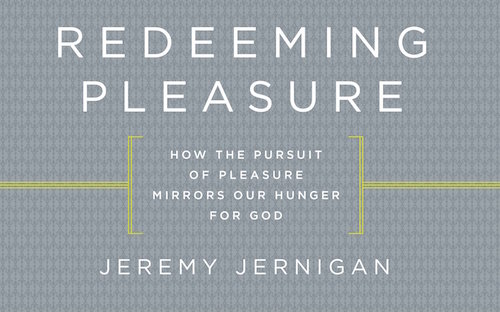We run our website the way we wished the whole internet worked: we provide high quality original content with no ads. We are funded solely by your direct support. Please consider supporting this project.

Greg Interviews Jeremy Jernigan on “Redeeming Pleasure”
Greg: Thanks for agreeing to this interview Jeremy. Having read your soon-to-be-published book Redeeming Pleasure, I’m really looking forward to its September 15 publication. Okay, to get started, suppose I’m a stranger and we meet in an elevator. I notice you have a book. I ask who wrote it and you tell me you did. I then reply, “Really? Well what is your the book about?” You’ve got 8 floors to tell me. Go!
Jeremy: Okay, here’s a play-by-play of how my answer would go…
Floor 1: I’ve learned that a lot of people think they need to choose between following God or enjoying life.
Floor 2: As a result we tend to make very bad decisions.
Floor 3: We either get a life defined by guilty pleasures or we get a dull and boring life trying to follow God.
Floor 4: But these are not our two choices.
Floor 5: Instead, what if we found a “life to the full” in the way we followed Jesus?
Floor 6: And I don’t mean health and wealth.
Floor 7: I believe we can when we reframe the conversation.
Floor 8: I think I missed my floor.
Greg: Clever boy you are! Can you tell us a little about what inspired you to address this topic and why do you think it’s so important?
Jeremy: I actually knew I wanted to write this book when I was in high school (although it was called The Deception of Pleasure at that time… in my head at least). I got tired of watching people assume God only aimed to bring us into a lifeless Christianity. If I viewed God the way they did I wouldn’t follow Him either. But God isn’t like that!
Greg: Who is this book written for, and what do you hope they’ll take away from it?
Jeremy: For a Christian reading it, I hope it would expand their view of God and reaffirm why following Jesus is worth it. For a non-Christian, I hope it would intrigue them that there’s a different way of thinking of God than they may have ever considered and that it’s worth a try to follow Jesus.
Greg: What do you think sets your book apart from other Christian books that address similar topics?
Jeremy: I offer ways to view God that tend to be the minority view in much of Christian thought today. However, many of these ideas have deep roots in the faith but are just now emerging more fully from our post-Christendom culture. This isn’t a health and wealth gospel. This is the gospel of an upside-down kingdom!
Greg: Now, in the course of unveiling why our quest for pleasure has gotten so messed you, you cover a number of interesting theological topics. Could you share some of topics you address and maybe say a word about any distinctive angle you have on them?
Jeremy: I don’t want to give too much away here, but suffice it to say that:
- You can believe in the concept of Hell without believing that God allows people to suffer for eternity. (#lovewins AND #freewillwins)
- You can believe in Jesus’s sacrifice on the cross (atonement) without believing that God is an angry, wrath-filled Father.
- You can trust God with the violence in the world without needing to resort to it yourself.
- You can live as a Christian without living under the weight of the 10 Commandments.
- You can adopt a Biblical view of homosexuality without having to shun gay people.
- You don’t have to believe that God is responsible for all the awful things in world.
Greg: Awesome! Okay, finally, what are one or two things about your book that you think might surprise most readers?
Jeremy: If you think that everything about Christianity in America is amazing, you’ll likely feel unsettled by this book. If you’ve felt in your soul that there’s something off about much of the collective Christian thought, I pray this will be a breath of fresh air. Also, our view of God matters more than we tend to realize.
Greg: Fantastic! Lord bless you and this work. I pray it impacts multitudes. So folks, I want you to know, this is not your “ordinary” Christian book. It packs a kingdom punch on so many levels! It is loaded with well-communicated and often distinctive theological insights, and yet it is immensely practical. I strongly encourage you to get this book and to tell your friends about it. If you tweet on it, use the hashtag #redeemingpleasure. And if you want to find out more about the book, go to www.redeemingpleasure.com.
Category: General
Tags: Christian Living, God's Character, Interview, Jeremy Jernigan, Redeeming Pleasure
Related Reading

Podcast: What is God’s Glory?
Greg considers competing concepts of what God’s glory is. http://traffic.libsyn.com/askgregboyd/Episode_0126.mp3

Podcast: Was it God Who Sent the Plagues in Exodus?
Greg discusses how God’s restraint from action is often written as an act (rather than a non-act). http://traffic.libsyn.com/askgregboyd/Episode_0075.mp3

Dying to Live
Image by Benjamin Corey A few days ago, Benjamin Corey over at Formerly Fundy posted a blog about an encounter he had with God in the Holy Land. He shared that he’s been going through a difficult time, and that God met him in a desolate place to speak to him. You should definitely hop…

Does God Intervene?
The Open View of the future recognizes the vast influence of all the angelic and human wills God created, which, in turn, influences the various outcomes and circumstances in life. Therefore life is arbitrary because of the way the decisions made by an unfathomably vast multitude of free agents intersect with each other. How life…

Tips on what NOT to say to someone struggling with their faith
Neal Fowler via Compfight Here’s a post from a year ago from Elizabeth Esther on What NOT to say to someone struggling with their faith. Historically, the church has been a very unsafe place for people expressing doubts or struggles. Let’s be safer than this. From the blog post: “Don’t throw the baby out with…

Isn’t the World Unsafe If God Doesn’t Control Everything?
If God isn’t in control of everything, the world feels unsafe. If the future is open and if things can happen outside of God’s will, what guarantee is there that there is a point to a person’s suffering? Maybe it’s all just bad luck. My experience has been that many of those who honestly examine…
